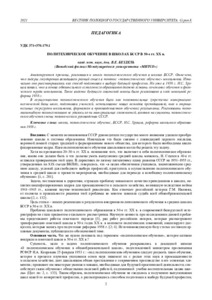Please use this identifier to cite or link to this item:
https://elib.psu.by/handle/123456789/27594Full metadata record
| DC Field | Value | Language |
|---|---|---|
| dc.contributor.author | Бездель, В. Е. | - |
| dc.contributor.author | Bezdzel, V. | - |
| dc.date.accessioned | 2021-06-29T08:34:53Z | - |
| dc.date.available | 2021-06-29T08:34:53Z | - |
| dc.date.issued | 2021 | - |
| dc.identifier.citation | Бездель, В. Е. Политехническое обучение в школах БССР в 50-е гг. ХХ в. / В. Е. Бездель // Вестник Полоцкого государственного университета. Серия E, Педагогические науки. - 2021. - № 7. - С. 2-6. | ru_RU |
| dc.identifier.uri | https://elib.psu.by/handle/123456789/27594 | - |
| dc.description.abstract | Анализируются причины, реализация и итоги политехнического обучения в школах БССР. Отмечено, что лидеры государства вкладывали разный смысл в понятие «политехническое обучение» школьников. Изначально оно рассматривалось как способ подготовки к выбору будущей профессии. Но уже в 1958 г. Н.С. Хрущев заявил, что в основе обязательного семилетнего образования должно лежать сочетание обучения и физического труда школьников. Такое видение будущего советской школы было реализовано в ходе школьной реформы 1958 г. В осуществлении политехнического обучения были как положительные (укрепление материально-технической базы школ, подготовка учителей, использование новых методов преподавания), так и отрицательные (перегрузка школьников, формализм в производственном обучении) результаты. Реализовать полномасштабную политехнизацию не удалось из-за материальных сложностей, влияния на сущность политехнического обучения смены политического руководства СССР.= The article analyzes the reasons, implementation and results of polytechnic education in BSSR schools. The author notes that the leaders of the state put different meanings in the concept of “polytechnic education” of schoolchildren. Initially, it was considered as a way to prepare for the choice of a future profession. But already in 1958, N. S. Khrushchev declared that the basis of compulsory seven-year education should be a combination of training and physical labor of schoolchildren. This vision of the future of the Soviet school was realized during the school reform of 1958. In the implementation of polytechnic training, there were both positive (strengthening the material and technical base of schools, training teachers, using new teaching methods) and negative (overloading of students, formalism in industrial training) results. It was not possible to implement full-scale polytechnization due to material difficulties, the impact on the essence of polytechnic training of the change of the political leadership of the USSR. | ru_RU |
| dc.language.iso | ru | ru_RU |
| dc.publisher | Полоцкий государственный университет | ru_RU |
| dc.relation.ispartof | Веснік Полацкага дзяржаўнага ўніверсітэта. Серыя E, Педагагічныя навукі | be_BE |
| dc.relation.ispartof | Herald of Polotsk State University. Series E, Pedagogical Sciences | en_EN |
| dc.relation.ispartof | Вестник Полоцкого государственного университета. Серия E, Педагогические науки | ru_RU |
| dc.relation.ispartofseries | Серия E, Педагогические науки;2021. - № 7 | - |
| dc.rights | open access | ru_RU |
| dc.subject | Государственный рубрикатор НТИ - ВИНИТИ::ОБЩЕСТВЕННЫЕ НАУКИ::Народное образование. Педагогика | ru_RU |
| dc.subject | Школа | ru_RU |
| dc.subject | Политехническое обучение | ru_RU |
| dc.subject | БССР | ru_RU |
| dc.subject | Н.С. Хрущев | ru_RU |
| dc.subject | Реформа школьного образова- ния 1958 г. | ru_RU |
| dc.subject | School | ru_RU |
| dc.subject | Polytechnic education, | ru_RU |
| dc.subject | BSSR | ru_RU |
| dc.subject | N.S. Khrushchev | ru_RU |
| dc.subject | School education reform 1958 | ru_RU |
| dc.title | Политехническое обучение в школах БССР в 50-е гг. ХХ в. | ru_RU |
| dc.title.alternative | Polytechnic Education in the Schools of the Bssr in the 50s of the XX Century | ru_RU |
| dc.type | Article | ru_RU |
| dc.identifier.udc | 371+370.179.1 | - |
| Appears in Collections: | 2021, № 7 | |
Items in DSpace are protected by copyright, with all rights reserved, unless otherwise indicated.
